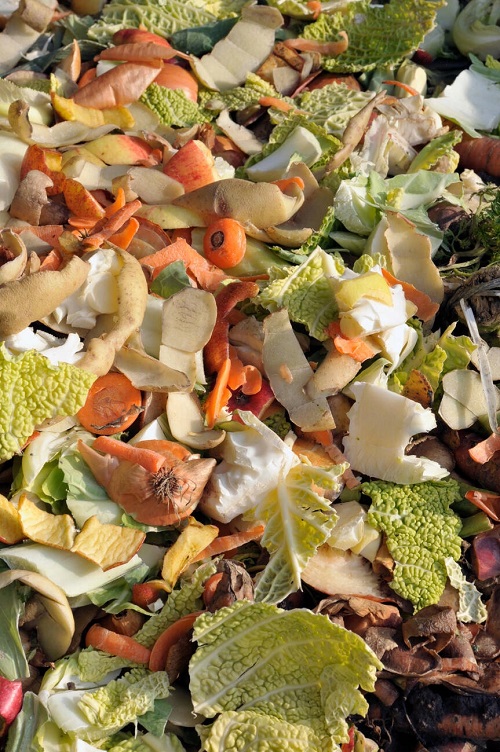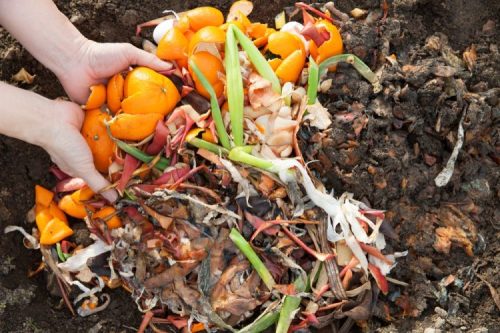Learn about some Awesome Citrus Peel Uses In Garden and how they can transform your gardening experience!
Explore these Awesome Citrus Peel Uses In Garden to add a splash of eco-friendly magic to your plant care routine. From natural pest repellent to nutrient-rich orange peels in compost, the possibilities are endless!
Awesome Citrus Peel Uses In Garden
1. Power Your Compost

Citrus peels are rich in essential nutrients like nitrogen, phosphorus, and potassium, making them an excellent addition to your compost pile. Still wondering, “Can you compost citrus peels?”
Here’s how to make the most of citrus peel uses for compost.
- Collect citrus peels from oranges, lemons, limes, or any other citrus fruits you use in your kitchen.
- Before adding your orange peels in compost, cut them into smaller pieces. This helps speed up the composting process by increasing the surface area for microbial activity.
- Mix the citrus peels with other compostable materials, such as vegetable scraps, coffee grounds, and yard waste.
- Turn the compost pile regularly to ensure proper aeration and decomposition.
- The citrus peels not only enrich the compost with essential nutrients but also help deter pests due to their strong aroma.
Composting citrus peels is really easy and provides tons of benefits for your plants.
2. Repel Pests Naturally
If your plants are suffering from mild pest infestation, avoid using chemical pesticides and try to repel them by using citrus peels.
Here’s how you can do it in simple steps.
- Gather Citrus Peels: Collect peels from citrus fruits like oranges, lemons, or grapefruits after you’ve used the fruit for eating or cooking.
- Tear into Small Pieces: Carefully tear the citrus peels into small pieces using your hands. Smaller pieces are easier to work with and release more of the citrus scent that pests dislike.
- Place Around Affected Plants: Scatter the torn citrus peel pieces around the plants that are suffering from pest infestation. Make sure to spread them evenly to cover the affected areas.
- Attach to Stems: Alternatively, you can tear a small hole in a citrus peel and attach it to a stem near the infected area. This ensures the scent is concentrated where it’s needed.
Citrus peels are a natural solution to pests and do not harm the environment, making this one of the best citrus peel uses.
3. Dog and Cat Repellant

Tired of your four-legged companions making a mess in your garden? Look no further than citrus peels to keep them at bay! Cats and dogs dislike the strong smell of citrus, making it a fantastic natural citrus peel uses.
Combine small pieces of these citrus peels with used coffee grounds, creating a powerful scent duo that pets won’t appreciate. Scatter this mixture strategically around your garden, especially in areas where your pets tend to roam.
Not only will this simple solution prevent them from visiting your garden, but the coffee grounds will also provide additional nutrients to fertilize your plants. With this eco-friendly approach, you can have a well-protected and flourishing garden without worrying about your furry friends causing any trouble.
4. Citrus Peels in the Fireplace
Have a bunch of citrus peels lying around? Don’t toss them away just yet! Instead, toss them into your fireplace for the most amazing citrus peel uses. This simple and clever idea lets you make the most of those citrus peels while adding a special touch to your garden gatherings.
When you’re ready to enjoy some outdoor time in your garden, throw those citrus peels into the fireplace. As they burn, they release a pleasant citrusy scent that envelops your garden, setting the perfect ambiance for a relaxing evening or a lively party. Say goodbye to waste and hello to a fresh and invigorating atmosphere!
5. Dried Citrus Peels for Acid Loving Plants

Don’t know what to do with citrus peels? Let them work wonders for your acid-loving plants. Dried citrus peels offer a fantastic way to acidify the soil and provide essential nutrients, promoting the lush growth of plants like azaleas, camellias, and blueberries.
Looking for uses for lemon peels in the garden? You’ve come to the right place. To get started, save the peels from lemons or any other citrus fruits you use in the kitchen. Lay them out to dry in a sunny spot, or use a food dehydrator for quicker results. Once fully dry, grind the peels into a fine powder.
Now, it’s time to give your plants a treat. Sprinkle the citrus peels in the garden on the soil around your acid-loving plants and gently mix them in. This simple and all-natural citrus peel uses effectively lowers the soil’s pH, creating the acidic environment that these plants adore.
Note: Keep in mind that the extent of pH lowering depends on the amount of citrus peel powder you use, so you can adjust the quantity accordingly.
6. Get Rid of Ants
Of all the ants that can infest your property, the southern fire ant is dreaded for its painful bites and swarming behavior. While commercial chemicals can eradicate them, a more eco-friendly alternative is a drench made from ground citrus rinds.
The citrus oil in the peels contains a toxic extract called d-limonene, effective against fire ants. So, don’t toss out your orange and lemon peels; instead, turn them into powerful liquid citrus peel uses. Here’s the recipe you can use.
Ingredients
- Lemon, lime, and orange peels (chopped into small pieces)
- Gallon jar with lid
- Water
- 1 teaspoon of molasses
- A squirt of dish soap
Steps
- Cut lemon, lime, and orange peels into small pieces about the size of a quarter. You can use any combination of citrus or just one kind, based on what’s available locally.
- Dump the sliced peels into a gallon jar, filling it halfway. Add water to the jar and cover it with a lid.
- Allow the jar to sit in a cool, dark place for three to five days until the peels become pale and the water takes on a colored hue.
- Pour the citrus peel extract through a strainer into a bowl, removing the spent peelings.
- Transfer the citrus peel extract back into the jar and add a teaspoon of molasses and a squirt of dish soap. Put the lid back on the jar and shake it well to mix the ingredients.
Pour the contents of the jar directly onto fire ant mounds. The citrus oil will kill the ants it touches, while the sweet smell of molasses will attract other ants to the area.
This organic citrus drench is also useful for eliminating ant trails from other types of ants, helping to keep them out of your home. Here’s the detailed recipe.
7. Citrus Peel Seed Starter Pot

Discover a creative and eco-friendly way to kickstart your seeds – the citrus peel seed starter pot!
Instead of using traditional plastic pots that end up broken, repurpose citrus peels to create biodegradable pots that nurture your seedlings and the environment.
8. Repel Mosquitoes
Say goodbye to pesky mosquitoes with the power of citrus peel uses! These buzzing insects can quickly turn a relaxing outdoor experience into an itchy nightmare. However, you can easily keep them at bay using this simple and all-natural solution.
Rub Citrus Peels on Your Skin
When you’re planning to spend time outdoors, don’t forget to bring along some citrus peels. Rub the peels directly onto your skin. Mosquitoes despise the scent of citrus, making it an effective natural repellent. The refreshing aroma will not only keep mosquitoes away but also leave you with a pleasant citrusy fragrance.
Use Grated Citrus Peels
Another of the best uses for lemon peels in the garden is grating these for repelling insects. Protect your outdoor spaces by using grated citrus peels strategically around your porch, patio, and garden. Grating the peels releases citrus oil, which acts as a natural mosquito repellent.
Scatter the grated peels in areas where mosquitoes are likely to congregate, creating a barrier they won’t want to cross.
Note: If you don’t know how to use a citrus peeler, you should be careful and use your hands. Otherwise, seek the help of a family member or the Internet.
9. Soil Amendment for Clay Soils
Want to know about citrus peel uses for the soil? Clay soils can present challenges in gardening due to their dense and compact nature, which can lead to poor drainage and root development. However, citrus peels offer a natural and effective solution to improve clay soils’ condition.
By integrating citrus peels into the soil, you can enhance its drainage and structure, creating a more conducive environment for healthy plant growth. Here is how you can do it.
- Choose the area of your garden with clay soil that needs improvement. Clear any debris or weeds from the surface.
- Dig holes or trenches in the clay soil, spaced several inches apart. Place the citrus peels into the holes or trenches.
- Once the citrus peels are in place, cover them with soil, ensuring they are well-buried. Water the area thoroughly to initiate the decomposition process.
10. Citrus and Vinegar Cleaner
Transform kitchen scraps into a potent and eco-friendly cleaning solution with this simple DIY Citrus Peel Vinegar Cleaner. By infusing white vinegar with citrus peels, you’ll create a powerful and natural cleaner that can be used on various garden tools and surfaces.
Plus, it serves as a sustainable way to repurpose spent citrus peels instead of throwing them away.
Ingredients
- Citrus peels (lemon, lime, orange, grapefruit, or a combination)
- White vinegar
Directions
- Gather citrus peels and place them in a glass jar.
- Cover the peels with white vinegar, submerging them completely.
- Let the mixture steep for a few weeks in a cool, dark place.
- Strain the cleaner to remove citrus peels.
- Transfer the citrus-infused vinegar into a spray bottle.
Use the cleaner on garden tools and surfaces for an effective and eco-friendly clean. You can find the detailed recipe here.
11. Refresh Potpourri and Sachets

Transform your kitchen scraps into a delightful and refreshing potpourri with the star ingredient – citrus peels! This easy DIY homemade potpourri is made from all-natural elements and doesn’t take much time to prepare.
By infusing your home with the sweet scents of orange, cranberries, cloves, and cinnamon sticks, you’ll create a warm and inviting atmosphere that will impress your guests and make your space feel cozy and welcoming.
With just a few simple steps, you can refresh your potpourri or make a new one with citrus peel uses and enjoy its beautiful fragrance for weeks to come. Here’s the full recipe.
12. Citrus-Infused Watering Can
Give your plants an extra boost of nutrients and improve their overall health by infusing your watering can with the essence of citrus peels. It’s a simple and effective way to provide trace nutrients to your greenery while keeping them well-hydrated. Here’s how you can do it.
- Collect citrus peels, such as orange, lemon, or lime, and place them in your watering can.
- Fill the watering can with water, making sure the peels are fully submerged.
- Allow the peels to sit in the water overnight, allowing their natural nutrients to infuse into the water.
- The next day, water your plants as usual with citrus-infused water. Your plants will receive citrus peel benefits along with hydration, promoting healthier growth and stronger resistance to pests and diseases.
- Refresh the water and citrus peels every few days to maintain the potency of the infusion.
Citrus peels contain essential nutrients like potassium, calcium, and magnesium, which are beneficial for plant growth. The infused water provides a gentle and natural way to nourish your plants without using chemical fertilizers.
You can also boil citrus peel water if you forgot to keep it overnight. Just let it cool before you water your plants.
13. Make a Citrus Peel Mulch

Here’s another of the best citrus peel uses. Create a nutrient-rich and eco-friendly citrus peel mulch to enhance your garden beds and support the healthy growth of your plants.
This mulch not only conserves moisture but also provides additional nutrients as it decomposes, enriching the soil and promoting the well-being of your plants.
Citrus peel mulch conserves soil moisture, reducing the need for frequent watering and preventing water evaporation. It acts as a natural weed suppressant, minimizing the growth of unwanted plants in your garden beds.
Furthermore, the decomposition of citrus peels releases nutrients slowly into the soil, providing a steady and consistent source of nourishment for your plants.
14. Citrus Peel Seed Germination Boost
Give your seeds an extra boost of vitality and increase germination rates with one of the most amazing citrus peel uses. The natural acids and moisture-retaining properties of citrus peels create a favorable environment for seed sprouting.
Place the citrus peels in a shallow container and dampen them with water. Carefully position the seeds on top of the moistened peels, ensuring they make contact with the surface.
Cover the container with a clear lid or plastic wrap to create a mini greenhouse effect, trapping moisture and warmth. Soon, the seeds will sprout.
The citrus peels provide a moist and nutrient-rich environment that encourages quicker and healthier seed germination. As the seeds sprout, they absorb essential nutrients and get citrus peel benefits, aiding their early growth stages.
15. Use it to Attract Butterflies

Citrus peels can serve as a natural and effective way to attract certain butterfly species to your garden, adding a burst of color and beauty to your outdoor space.
How to Use Citrus Peels as Butterfly Attractors
- Citrus Peel Plates: Create citrus peel plates by cutting oranges, grapefruits, or other citrus fruits in half. Scoop out the flesh and enjoy the juicy treat. Then, place the hollowed-out halves in your garden, filled with a small amount of water. Butterflies will be attracted to these natural nectar stations, providing them with a valuable food source.
- Fruit Feeding Stations: Apart from hollowed halves, you can also place sliced citrus fruits or peels directly on flat surfaces, such as rocks or tree stumps, to create feeding stations for butterflies. The sweet scent of citrus will draw them in, and they’ll be enticed to land and feed.
The Eastern Tiger Swallowtail (Papilio glaucus) and the Red Admiral (Vanessa atalanta) are striking butterfly species that you can attract with such unique citrus peel uses.




I always love the smell of fresh citrus. Very refreshing. Number 7 is so creative.
Is it possible to reuse lemon rinds and place the rinds in your citrus trees soil?
Will they help maintaining a rock hard erection? That is all I really care about.
Yes, but you have to chew the rinds of at least 5 citrus fruits and then brush your tooth.
I tried it! THANKS!! WOWSER!